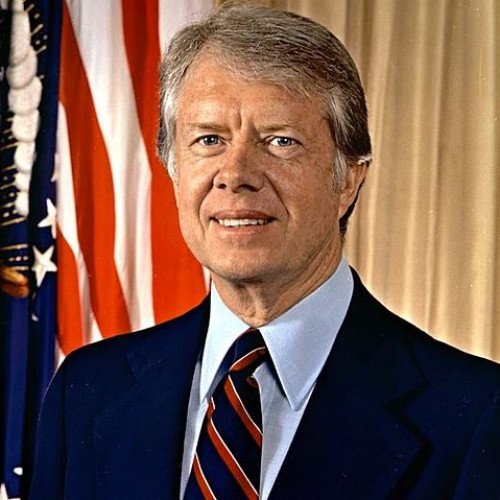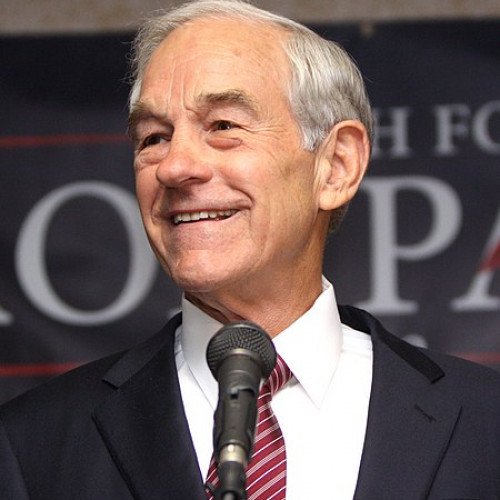Jimmy Carter VS Ron Paul

Jimmy Carter
James Earl Carter Jr. (born October 1, 1924) is an American politician and philanthropist who served as the 39th president of the United States from 1977 to 1981. A member of the Democratic Party, he previously served as a Georgia State Senator from 1963 to 1967 and as the 76th governor of Georgia from 1971 to 1975. Since leaving the presidency, Carter has remained engaged in political and social projects as a private citizen. In 2002, he was awarded the Nobel Peace Prize for his work in co-founding the Carter Center. Raised in Plains, Georgia, Carter graduated from the United States Naval Academy in 1946 with a Bachelor of Science degree and joined the United States Navy, where he served on submarines. After the death of his father in 1953, Carter left his naval career and returned home to Georgia to take up the reins of his family's peanut-growing business. Carter inherited comparatively little due to his father's forgiveness of debts and the division of the estate among the children. Nevertheless, his ambition to expand and grow the Carters' peanut business was fulfilled. During this period, Carter was motivated to oppose the political climate of racial segregation and support the growing civil rights movement. He became an activist within the Democratic Party. From 1963 to 1967, Carter served in the Georgia State Senate, and in 1970, he was elected as Governor of Georgia, defeating former Governor Carl Sanders in the Democratic primary on an anti-segregation platform advocating affirmative action for ethnic minorities. Carter remained as governor until 1975. Despite being a dark-horse candidate who was little known outside of Georgia at the start of the campaign, Carter won the 1976 Democratic presidential nomination. In the general election, Carter ran as an outsider and narrowly defeated incumbent Republican President Gerald Ford. On his second day in office, Carter pardoned all the Vietnam War draft evaders by issuing Proclamation 4483. During Carter's term as president, two new cabinet-level departments, the Department of Energy and the Department of Education, were established. He established a national energy policy that included conservation, price control, and new technology. In foreign affairs, Carter pursued the Camp David Accords, the Panama Canal Treaties, the second round of Strategic Arms Limitation Talks (SALT II), and the return of the Panama Canal Zone to Panama. On the economic front, he confronted stagflation, a persistent combination of high inflation, high unemployment and slow growth. The end of his presidential tenure was marked by the 1979–1981 Iran hostage crisis, the 1979 energy crisis, the Three Mile Island nuclear accident, and the Soviet invasion of Afghanistan. In response to the invasion, Carter escalated the Cold War when he ended détente, imposed a grain embargo against the Soviets, enunciated the Carter Doctrine, and led a 1980 Summer Olympics boycott in Moscow. In 1980, Carter faced a challenge from Senator Ted Kennedy in the primaries, but he won re-nomination at the 1980 Democratic National Convention. Carter lost the general election to Republican nominee Ronald Reagan in an electoral landslide. He is the only president in American history to serve a full term of office and never appoint a justice to the Supreme Court. Polls of historians and political scientists usually rank Carter as a below-average president. Carter's activities since leaving the presidency have been viewed more favorably than his presidency itself. In 1982, Carter established the Carter Center to promote and expand human rights. He has traveled extensively to conduct peace negotiations, monitor elections, and advance disease prevention and eradication in developing nations. Carter is considered a key figure in the Habitat for Humanity charity. He has written over 30 books, ranging from political memoirs to poetry, while continuing to actively comment on ongoing American and global affairs such as the Israeli-Palestinian conflict.
Statistics for this Xoptio

Ron Paul
Ronald Ernest Paul (born August 20, 1935) is an American author, physician, and retired politician who served as the U.S. Representative for Texas's 22nd congressional district from 1976 to 1977 and again from 1979 to 1985, and for Texas's 14th congressional district from 1997 to 2013. On three occasions, he sought the presidency of the United States: as the Libertarian Party nominee in 1988 and as a candidate in the Republican primaries of 2008 and 2012. A self-described constitutionalist, Paul is a critic of the federal government's fiscal policies, especially the existence of the Federal Reserve and the tax policy, as well as the military–industrial complex, the war on drugs, and the war on terror. He has also been a vocal critic of mass surveillance policies such as the USA PATRIOT Act and the NSA surveillance programs. He was the first chairman of the conservative PAC Citizens for a Sound Economy, a free-market group focused on limited government, and has been characterized as the "intellectual godfather" of the Tea Party movement, a fiscally conservative political movement that is largely against most matters of interventionism.Paul served as a flight surgeon in the U.S. Air Force from 1963 to 1968, and worked as an obstetrician-gynecologist from the 1960s to the 1980s. He became the first Representative in history to serve concurrently with a child in Congress when his son, Rand Paul, was elected to the U.S. Senate from Kentucky in 2010. Paul is a Senior Fellow of the Mises Institute, and has published a number of books and promoted the ideas of economists of the Austrian School such as Murray Rothbard, Friedrich Hayek, and Ludwig von Mises during his political campaigns. After the popularity of his 2008 presidential bid, Paul announced in July 2011 that he would forgo seeking another term in Congress in order to focus on his 2012 bid for the presidency. Finishing in the top four with delegates in both races (while winning four states in the 2012 primaries), he refused to endorse the Republican nominations of John McCain and Mitt Romney during their respective 2008 and 2012 campaigns, and on May 14, 2012, Paul announced that he would not be competing in any other presidential primaries but that he would still compete for delegates in states where the primary elections had already been held. At both the 2008 and 2012 Republican National Conventions, Paul received the second-highest amount of delegates behind only McCain and Romney respectively. In January 2013, Paul retired from Congress but still remains active on college campuses, giving speeches promoting his libertarian vision. He also continues to provide political commentary through The Ron Paul Liberty Report, a web show he co-hosts on YouTube. Paul received one electoral vote from a Texas faithless elector in the 2016 presidential election, making him the oldest person to receive an electoral vote, as well as the second registered Libertarian presidential candidate in history to receive an Electoral College vote, after John Hospers in 1972.